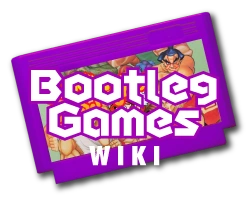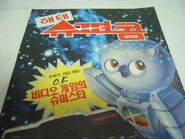Supercom (Hangul: 슈퍼콤, Syupeokom), also known as Haitai Supercom (해태 슈퍼콤, Haetae Syupeokom) was a video game publisher and distributor active in South Korea around 1989 to 1993. It was set up by Haitai, a big South Korean conglomerate at the time. In 1993 they got the rights to distribute the PC-Engine in South Korea but the console failed to sell there. Haitai closed Supercom at that time.
Activities
Supercom was apparently the official distributor of Whirlwind Manu catalog in Korea. They made their own cover for each releases often featuring Hangul and their logo. the games were sometime retailed with a plastic tape box with a generic cover. They also manufactured their own cartridges cases at a point. In the end of 1990, some Japanese publishers alongside with Nintendo sued Haitai for selling their games illegally. Supercom went on to distribute titles licensed in South Korea by Daou Infosys from Tengen then Color Dreams. They seem to have ended their Famicom activities in 1992 with the release of Magic Kid Googoo and the production of their last clone, the Supercom X-1600.
Consoles
- Supercom - Rebranded Aaronix AX-9900. Released in October 1989.
- Supercom II - Design based on the previous console, released in April 1991
- Supercom V-1600 - Smaller and rounded version of the Aaronix design. Advertised in magazines for an april 1991 release but may have gone unreleased in favor of the X-1600 which is identical.
- Supercom X-1600 - Same as the V-1600, came with wired and infrared controllers. 42 built-in games.
- Supercom X-Plus - Distributed by Kobo in 1992 under license from Haitai. Same as the X-1600.
Games
Color Dreams
- Baby Boomer (Likely the first Color Dreamsgame released by Daou)
- Challenge of the Dragon
- Crystal Mines
- Menace Beach
Tengen
- Klax
- Road Runner
- Skull & Crossbones
- Toobin
Zemina
- Magic Kid Googoo (Supercom logo is printed on the box)
Trivia
- During November 1990, Haitai got sued by a group of Japanese publishers for distributing illegal copies of Famicom games, the case was settled out of court.
- Haitai is still in business today, but only the food branch remains.
- The games licensed from Color Dreams all feature a Hangul title screen (except Baby Boomer) and updated copyrights with the rest of the game being unchanged. As for the Tengen games, only the copyright was changed for Skull & Crossbones and Toobin.
- All games licensed from Tengen (except Road Runner, which probably hasn't been found?) and Baby Boomer had a second release with a different cover, lacking the Haitai and Supercom logos.

